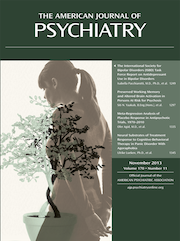Neuropsychological Impairments in Schizophrenia and Psychotic Bipolar Disorder: Findings from the Bipolar-Schizophrenia Network on Intermediate Phenotypes (B-SNIP) Study
Abstract
Objective
Familial neuropsychological deficits are well established in schizophrenia but remain less well characterized in other psychotic disorders. This study from the Bipolar-Schizophrenia Network on Intermediate Phenotypes (B-SNIP) consortium 1) compares cognitive impairment in schizophrenia and bipolar disorder with psychosis, 2) tests a continuum model of cognitive dysfunction in psychotic disorders, 3) reports familiality of cognitive impairments across psychotic disorders, and 4) evaluates cognitive impairment among nonpsychotic relatives with and without cluster A personality traits.
Method
Participants included probands with schizophrenia (N=293), psychotic bipolar disorder (N=227), schizoaffective disorder (manic, N=110; depressed, N=55), their first-degree relatives (N=316, N=259, N=133, and N=64, respectively), and healthy comparison subjects (N=295). All participants completed the Brief Assessment of Cognition in Schizophrenia (BACS) neuropsychological battery.
Results
Cognitive impairments among psychotic probands, compared to healthy comparison subjects, were progressively greater from bipolar disorder (z=–0.77) to schizoaffective disorder (manic z=–1.08; depressed z=–1.25) to schizophrenia (z=–1.42). Profiles across subtests of the BACS were similar across disorders. Familiality of deficits was significant and comparable in schizophrenia and bipolar disorder. Of particular interest were similar levels of neuropsychological deficits in relatives with elevated cluster A personality traits across proband diagnoses. Nonpsychotic relatives of schizophrenia probands without these personality traits exhibited significant cognitive impairments, while relatives of bipolar probands did not.
Conclusions
Robust cognitive deficits are present and familial in schizophrenia and psychotic bipolar disorder. Severity of cognitive impairments across psychotic disorders was consistent with a continuum model, in which more prominent affective features and less enduring psychosis were associated with less cognitive impairment. Cognitive dysfunction in first-degree relatives is more closely related to psychosis-spectrum personality disorder traits in psychotic bipolar disorder than in schizophrenia.



